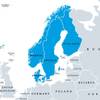The U.N. refugee agency on Tuesday urged European leaders to put the protection of migrants at the center of debate over the crisis in the Mediterranean and to do more to help Greece and Italy cope.
After as many as 900 people drowned in a ship off the coast of Libya this weekend, EU ministers on Monday called an extraordinary summit for Thursday and made an action plan.
More than 36,000 have tried to cross the Mediterranean this year, the UNHCR says, mostly from Libya, and nearly 1,800 are feared to have died in the attempt.
The U.N. High Commissioner for Refugees (UNHCR) welcomed the plan as a good start but noted its emphasis on law enforcement.
"We need to make sure that the asylum component and the protection of people component is one that is prioritised within these measures," assistant U.N. High Commissioner for protection, Volker Turk, told a Geneva news briefing.
The plan, which includes reinforcing naval patrols in the Mediterranean, destroying vessels used by people smugglers, and measures to deal with migrants arriving in Europe, also drew only cautious approval from Italian Prime Minister Matteo Renzi.
"Yesterday, for the first time, all of Europe was alert and supportive, making some tangible commitments that we will try to clarify before the European Council meeting," he wrote on Facebook.
The plan, if put into effect, would be a "first step" in a long process, said Renzi, who has long called for more support in dealing with the influx of migrants.
The UNHCR has proposed increasing search and rescue operations, enhancing resettlement of refugees, admission on humanitarian grounds, and alternative legal channels to enter Europe, Turk said.
EU talks should ensure Greece and Italy are able to "call on the solidarity measures from the rest of the European Union" to help process asylum applications and redistribute people found in need, he said.
Speaking at the same briefing, UNHCR spokesman Adrian Edwards, said: "In 2014, the Mediterranean emerged as the deadliest waters in the world for refugees and migrants to be crossing, on average one in 50 people who attempted the crossing perished in the attempt."
"So far this year it's one in 18, so the numbers are really going in the wrong direction," he said.
(By Stephanie Nebehay; Additional reporting by Isla Binnie; Editing by Louise Ireland)












